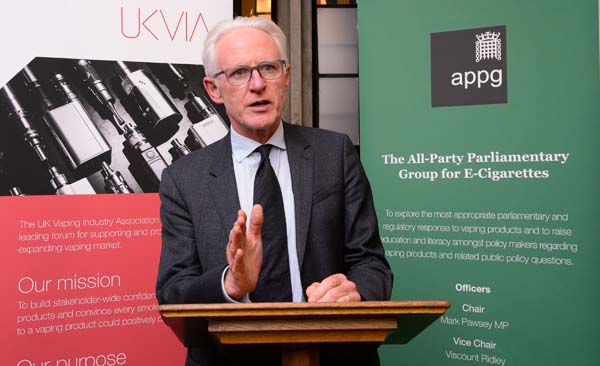Malaysia’s Minister of Health, Dzulkefly Ahmad, has been asked whether he has been reading the evidence about electronic cigarettes coming out of the UK.
This question was raised in an opinion piece in the Malay Mail by Sarah Zailana Hamid, who made the point that while nobody was saying that e-cigarettes were absolutely safe, what was being said was that they were less harmful than were combustible cigarettes.
She said she hoped that Malaysia would move towards a similar stance as that recommended in a report published on Friday by the UK House of Commons Science and Technology Committee.
Such a stance would allow for the usage of e-cigarettes while conducting annual reviews to determine the long-term effects with a publicly funded health committee providing oversight.
‘Because if our government insists on waiting until those long-term effects are visible, we will be looking at no alternative to smoking and thus, letting the Malaysian smoking population continue to miss the opportunity for a less harmful choice,’ she said.
‘The report also pointed out the stigma over vaping, and how the second-hand vapor had “negligible health risks”. Thus, the media should bear some responsibility for demonising the vaping community in the past which led to the overreaction from our authorities and the general public.
‘Truth be told, there is a need for an independent study of Malaysians on e-cigarettes and such devices, a monitoring of their long-term health effects, while the government allows these products to be promoted as an alternative to traditional cigarettes for people trying to quit smoking.
‘I do hope that Dzulkefly manages to push through such a change so that we can truly move forward towards a healthier Malaysia with the principle of harm reduction rather than an outright ban.’
Category: People

A rational approach

E-cigs: the ray of hope
A new report exploring General Practitioners’ prescribing practices for quitting services and treatment in the UK has revealed that 75 percent fewer ‘stop smoking’ aids were dispensed in 2016-17 than in 2005-6, according to a story on Practice Business.
The report, published by the British Lung Foundation, was said to have reflected on the impact this decline is likely to have on patients and healthcare provisions in the long-term.
In taking a closer look at ‘what GP practices can do to push forward in the fight against smoking and to support cessation’, Practice Business looked in part at the question of vaping, under the heading: To vape or not to vape; advice on e-cigarettes.
For people who smoked and who were using, or were interested in using, a nicotine-containing e-cigarette on general sale to quit smoking, Practice Business quoted NICE [National Institute for Health and Care Excellence] guidelines.
These guidelines apparently say that though these products are not licensed medicines, they are regulated by the Tobacco and Related Products Regulations 2016; and that many people have found them helpful to quit smoking cigarettes.
‘People using e-cigarettes should stop smoking tobacco completely, because any smoking is harmful,’ the guidelines say.
‘The evidence suggests that e-cigarettes are substantially less harmful to health than smoking but are not risk-free; the evidence in this area is still developing, including evidence on the long-term health impact.’
New warnings in India
The Indian Ministry of Health and Family Welfare has released new images to be included as graphic health warnings on tobacco products starting September 1.
According to a News18.com story relayed by the TMA, last week, the Supreme Court said that tobacco products would continue to carry graphic warnings covering 85 percent of the packaging space.
The government apparently released two separate set of images, the first of which will be used on tobacco products for 12 months beginning September 1, with the second to be used subsequently.
‘All tobacco products manufactured or imported or packaged on or after 1st September 2018 shall display Image-1 and those manufactured or imported or packaged on or after 1st September 2019 shall display Image-2,’ the ministry said in a statement.
‘Any person engaged directly or indirectly in the production, supply, import or distribution of cigarettes or any tobacco products shall ensure that all tobacco product packages shall have the specified health warnings exactly as prescribed.’
Violation of the provision is a punishable offence with imprisonment or fine as prescribed in Section 20 of the Cigarettes and Other Tobacco Products (Prohibition of Advertisement and Regulation of Trade and Commerce, Production, Supply and Distribution) Act, 2003.
New thinking in Australia
Electronic cigarettes are starting to garner support even in Australia where laws differ from state to state but where, in effect, the sale of e-liquids containing nicotine is either banned or heavily restricted.
According to a story by Sian Powell for The Australian, in Australia e-cigarettes are ‘winning major support from official and political organisations’, including the Liberal Party of Western Australia and the CSIRO’ [the Commonwealth Scientific and Industrial Research Organisation, an independent Australian federal government agency responsible for scientific research].
Elsewhere, the UK’s House of Commons Science and Technology Committee on e-cigarettes on Friday endorsed their use as a quit-smoking aid.
‘E-cigarettes present an opportunity to significantly accelerate already declining smoking rates, and thereby tackle one of the largest causes of death in the UK today,’ Powell said in quoting the report. ‘They are substantially less harmful – by around 95 percent – than conventional cigarettes.’
The UK report had recommended relaxing e-cigarette licensing and advertising regulations and potentially relaxing e-cigarette taxes and rules on their use in public places.
When ultra-fine is not fine
The European Commission has said that it is carrying out a fitness check of its two EU Ambient Air Quality directives to determine by next year whether they are ‘fit for purpose’.
The Commission was responding to a question From a French member of the European Parliament inspired by reports of poor air quality at Étang de Berre, which is in the south of France and which comprises one of the largest industrial areas in Europe, with more than 200 factories.
‘It turns out that, in 2010, the French Institute for Public Health Surveillance highlighted an excessive number of hospitalizations for cardiovascular conditions and for multiple illnesses west of Étang de Berre,’ Mélin said in a preamble to her question.
‘In January 2017, new information emerged from the community-based participatory environmental health survey (CBPEH), which noted the high likelihood of a link “between the illnesses and industrial pollution”.
‘However, in 2011, the Eco-citizen Institute launched campaigns to measure the air quality, which resulted in it noting that the air around the industrial area “was made up of 80 percent ultra-fine particulate matter and [that] the chemical composition of the air pollutants was extremely complex”.
‘Ultra-fine particulate matter is the most dangerous for our health because it gets deep into our bodies.
‘However, if Air Paca [a non-profit association that manages the air quality survey network in south-eastern France’s Provence Alpes Côte d’Azur region] does not measure it, it is because European legislation does not require member states to measure the levels of ultra-fine particulate matter.
‘Therefore, we would like to know whether the Commission wishes to encourage member states to measure the levels of ultra-fine particulate matter in order to assess toxicity of the air in industrial areas in more detail.’
In response, the Commission said that when the World Health Organization published its latest Air Quality Guidelines in 2006, it had concluded that, while there was considerable toxicological evidence of potential detrimental effects of ultra-fine (UF) particles on human health, the existing body of epidemiological evidence was insufficient to reach a conclusion on the exposure–response relationship of UF particles. ‘Therefore, no recommendations were provided at that time as to guideline concentrations of UF particles,’ the Commission said in its written reply.
‘The Ambient Air Quality directives, which were last revised in 2008, do not require the assessment of air quality with respect to ultrafine particles.
‘The Commission is carrying out a fitness check of the two EU Ambient Air Quality directives, which will evaluate whether these two complementary directives are “fit for purpose” by assessing the overall performance of this regulatory framework with respect to its policy objectives.
‘The fitness check covers all provisions of the two EU Ambient Air Quality directives. In particular, it will include an assessment of the extent to which the directives continue addressing the most pressing air pollutants and set meaningful air quality standards to protect human health and ecosystems in accordance with the evolving scientific understanding.
‘The findings of the fitness check will be used to inform further reflections on whether the directives continue to provide the appropriate legislative framework to ensure protection from adverse impacts on, and risks to, human health and the environment.
‘The Commission expects to conclude this fitness check in 2019.’
Harm reduction within reach
Members of parliament have warned the UK Government that misconceptions about electronic cigarettes mean that it is missing an opportunity to tackle a major cause of death.
In a press note issued today alongside its report, E-cigarettes, the House of Commons Science and Technology Committee said that these products, estimated to be 95 percent less harmful than conventional cigarettes, were too often being overlooked as a stop-smoking tool by the National Health Service (NHS).
‘Regulations should be relaxed relating to e-cigarettes’ licensing, prescribing and advertising of their health benefits,’ the note said. ‘Their level of taxation and use in public places must be reconsidered.’
In what will be seen by many as one of its most important interventions, the Committee said that it believed the risk for smokers of continuing to use conventional cigarettes was greater than the uncertainty over the long-term use of e-cigarettes. ‘To gather independent health-related evidence on e-cigarettes and heat-not-burn products, the Committee is calling on the Government to support a long-term research programme overseen by Public Health England and the Committee on Toxicity of Chemicals in Food, Consumer Products and the Environment,’ the note said. ‘The Government should make its research available to the public and to health professionals.’
The chair of the Committee, Norman Lamb MP (pictured in 2017), said smoking remained a national health crisis and the Government should be considering innovative ways of reducing the smoking rate. “E-cigarettes are less harmful than conventional cigarettes, but current policy and regulations do not sufficiently reflect this and businesses, transport providers and public places should stop viewing conventional and e-cigarettes as one and the same,” he said. “There is no public health rationale for doing so.
“Concerns that e-cigarettes could be a gateway to conventional smoking, including for young non-smokers, have not materialised. If used correctly, e-cigarettes could be a key weapon in the NHS’s stop smoking arsenal.”
The Committee is recommending that:- ‘The Government, the MHRA (Medicines and Healthcare products Regulatory Agency) and the e-cigarette industry should review how approval systems for stop smoking therapies could be streamlined should e-cigarette manufacturers put forward a product for medical licensing.
- ‘There should be a wider debate on how e-cigarettes are to be dealt with in our public places, to help arrive at a solution which at least starts from the evidence rather than misconceptions about their health impacts.
- ‘The Government should continue to annually review the evidence on the health effects of e-cigarettes and extend that review to heat-not-burn products. Further it should support a long-term research programme overseen by Public Health England and the Committee on Toxicity of Chemicals in Food, Consumer Products and the Environment with an online hub making evidence available to the public and health professionals.
- ‘The limit on the strength of refills should be reviewed as heavy smokers may be put off persisting with them — and the restriction on tank size does not appear to be founded on scientific evidence and should therefore urgently be reviewed.
- ‘The prohibition on making claims for the relative health benefits of stopping smoking and using e-cigarettes instead has prevented manufacturers informing smokers of the potential benefits and should be reviewed to identify scope for change post-Brexit.
- ‘There should be a shift to a more risk-proportionate regulatory environment; where regulations, advertising rules and tax duties reflect the evidence of the relative harms of the various e-cigarettes, heat-not-burn and tobacco products available.
- ‘NHS England should set a policy of mental health facilities allowing e-cigarette use by patients unless trusts can demonstrate evidence-based reasons for not doing so.
- ‘The Government should review the evidence supporting the current ban on snus as part of a wider move towards a more risk aware regulatory framework for tobacco and nicotine products.’
In welcoming the report, the UK’s New Nicotine Alliance (NNA) said that it contained several evidence-based policy proposals that would positively transform the way vaping was viewed by businesses, institutions and the public alike.
It said that it ‘warmly welcomes this report for its clear and unequivocal message that e-cigarettes and other alternative nicotine products are far safer than combustible tobacco and should be treated as such’.
“E-cigarettes are a proven safer alternative to smoking and the UK boasts 1.5 million former smokers who have converted from combustible tobacco to exclusively vaping instead,” said Sarah Jakes, the NNA chair. “The Science and Technology Committee has wisely recognised that misconceptions about e-cigarettes are threatening further progress in encouraging their use by smokers who choose to quit.
“We welcome the Committee’s call for a root and branch review of how risk-reduced products are treated by businesses, institutions and government itself. The report is a beacon of enlightenment in an area of public health which is often burdened by dogma and outdated thinking towards the use of nicotine…”
Jakes said also that there was a lot of confusion about e-cigarettes among the public, health institutions and businesses; so the report was timely and could have hugely positive implications for public health if its recommendations were implemented in full.
“Sir Norman’s Committee has done an excellent job of peering through the mist of misunderstanding surrounding e-cigarettes and its policy proposals can go a long way to dispel the – often deliberately fabricated – misconceptions that are deterring many thousands of smokers from switching,” she said. “We would urge the government to read the Committee’s findings carefully and act on them without delay”
Commenting on the report, the Vaping Industry Association (UKVIA) said that, following an extensive inquiry into e-cigarettes, the Committee had concluded that the government was missing significant opportunities to tackle UK smoking rates.
The UKVIA highlighted that the Committee had urged the government to consider tax breaks for vaping products; to allow wider use of vaping in public places; and to create a streamlined route to medically licenced vaping products.
It pointed out too that the report called on the government to reconsider the regulations around e-cigarette packaging and advertising. ‘Advertising rules currently prevent the industry from making health claims comparing vaping to smoking,’ said the UKVIA. ‘The Committee believes this is stopping UK smokers (almost seven million), from making informed decisions about switching to vaping …’
The report said also that restrictions on nicotine strength, tank size and bottles was not founded on scientific evidence and should be urgently reviewed.
“The Science and Technology Committee report is a ringing endorsement of vaping’s public health potential,” said John Dunne, who appeared before the Committee on behalf of the UKVIA.
“They are absolutely right that advertising restrictions are preventing smokers from hearing the truth. More and more people wrongly believe vaping to be more harmful or as harmful as smoking. This is a direct consequence of advertising restrictions that prevent the industry from telling smokers that vaping is 95 percent less harmful. If health bodies can say it, why can’t we?
“The industry is pleased to see the Committee recognise the nonsensical packaging and nicotine strength regulations, that only hamper vaping’s potential appeal to smokers looking for an alternative.”
Qualified support
The smokers’ group Forest has issued a qualified welcome to a report by the House of Commons Science and Technology Committee on electronic cigarettes.
Forest welcomed a call by MPs on the Committee to relax e-cigarette advertising regulations and to review the current limit on the strength of refills and the restriction on the size of tanks.
But it warned against medical licensing of e-cigarettes.
“We welcome the Committee’s open-minded approach to e-cigarettes,” said the director of Forest, Simon Clark.
“We agree that, post-Brexit, manufacturers should be allowed to inform smokers of the potential health benefits of switching to e-cigarettes.
“We agree too that the limit on the strength of refills and the restriction on tank size should be reviewed.”
But on the subject of medicinal licensing, Clark warned that such a move could damage the appeal of vaping for millions of smokers.
“The success of e-cigarettes to date has been based on the fact that they allow smokers who want to quit to switch to a product that, for many people, is as pleasurable as the cigarettes they are giving up,” he said.
“Aligning e-cigarettes with products such as nicotine patches and gum could be counter-productive.”
No room for smokers
Campaigners have condemned plans to extend the smoking ban to all hotel bedrooms and mental health units in Wales.
In a submission to a Welsh Government consultation that closes today, the smokers’ group Forest has criticized proposals to prohibit smoking rooms in mental health units and to remove the exemption that allows designated smoking bedrooms in hotels, guesthouses, inns and members’ clubs.
‘After being admitted to a mental health unit, some patients, who may be suffering from great anxiety or stress, consider smoking to be one of their few remaining liberties or pleasures,’ Forest said as part of its submission.
‘A designated smoking room can help vulnerable patients who smoke adapt to an environment that may be very alien to them.
‘Denying them the chance to light up in comfort in a designated smoking room is not only unreasonable, it’s a curtailment of a freedom they previously enjoyed at home.’
In response to the proposal to ban designated smoking bedrooms in hotels, guesthouses, inns, hostels and members’ clubs, Forest said in its submission that if owners and proprietors wanted to offer bedrooms where guests could smoke they should be allowed to do so. ‘Likewise the designated smoking bedroom policy in members’ clubs should be a matter for members not government,’ it said.
‘The 2007 regulations permitted hotels, guesthouses, inns, hostels and members’ clubs to provide designated bedrooms where guests could smoke because it was argued that, however briefly, they are a place of residence and should be treated as such.
‘Removing the exemption would be an unnecessary and unwelcome imposition on the few remaining businesses that choose to accommodate guests who like to book a bedroom where they can smoke in comfort.’
Simon Clark, the director of Forest, said that none of these proposals had anything to do with public health because non-smokers were already very well protected from the exaggerated risks of other people’s smoke.
“Extending the smoking ban by prohibiting the few remaining smoking rooms that were exempt from the 2007 regulations is an unwarranted abuse of power,” he said.
“We urge ministers to think again and respect the fact that tobacco is a legal product. If adults choose to smoke in full knowledge of the health risks that’s a matter for them, not government.”
Prison isn't working
Australians in prison need better support than they are currently getting to help them quit smoking tobacco and improve their long-term health, according to a story on theconversation.com. They deserve the same quitting services as those available in the community.
Smoking has been banned in all prisons in Queensland, the Northern Territory, Tasmania, Victoria, and New South Wales since 2015. South Australia is due to introduce such a ban in 2019, while smoking is still permitted in prison cells in Western Australia and the Australian Capital Territory.
The Conversation story said that smoking bans had been well received by most Australian prisoners, with most saying they wanted to stay off cigarettes.
However, besides making nicotine lozenges available for purchase (and patches before that), Australian prison or health authorities had not implemented any formal program to help people in prison quit smoking, or to stay off cigarettes when they were released.
The story said that about 74 percent of people entering the prison system were smokers. This was partly because groups who smoked at higher rates in the community – such as people who were financially poor and disadvantaged, who identified as Indigenous, or who experienced mental-health or substance-use disorders – were all overrepresented in prisons.
But despite not having access to regular cigarettes while incarcerated, 94 percent of former prisoners resumed the habit on release, and many went on to develop smoking-related illnesses.
Simply providing nicotine lozenges wasn’t enough to change the entrenched behaviour of long-term smokers.
All of a twitter
The tobacco industry’s ‘global online activities’ need to be regulated, according to researchers in Australia.
‘Transnational tobacco companies are using Twitter to oppose tobacco control policy and shape their public identity by promoting corporate social responsibility initiatives in violation of [the] WHO [World Health Organization] Framework Convention on Tobacco Control,’ the researchers concluded in the abstract of a Tobacco Control paper published on the BMJ Journals website.
‘The tobacco industry has a long history of opposing tobacco control policy and promoting socially responsible business practices. With the rise of social media platforms, like Twitter, the tobacco industry is enabled to readily and easily communicate these messages.
The researchers said that all tweets published by the primary corporate Twitter accounts of British American Tobacco, Imperial Brands, Philip Morris International and Japan Tobacco International had been downloaded in May 2017 and manually coded under 30 topic categories.
Out of the 3,301 tweets analysed the most prominent categories of tweets were said to have been on topics that opposed or critiqued tobacco control policies (36.3 percent of BAT’s tweets, 35.1 percent of Imperial’s tweets, 34.0 percent of JTI’s tweets and 9.6 percent of PMI’s tweets).
All companies were said to have tweeted consistently to promote an image of being socially and environmentally responsible.









